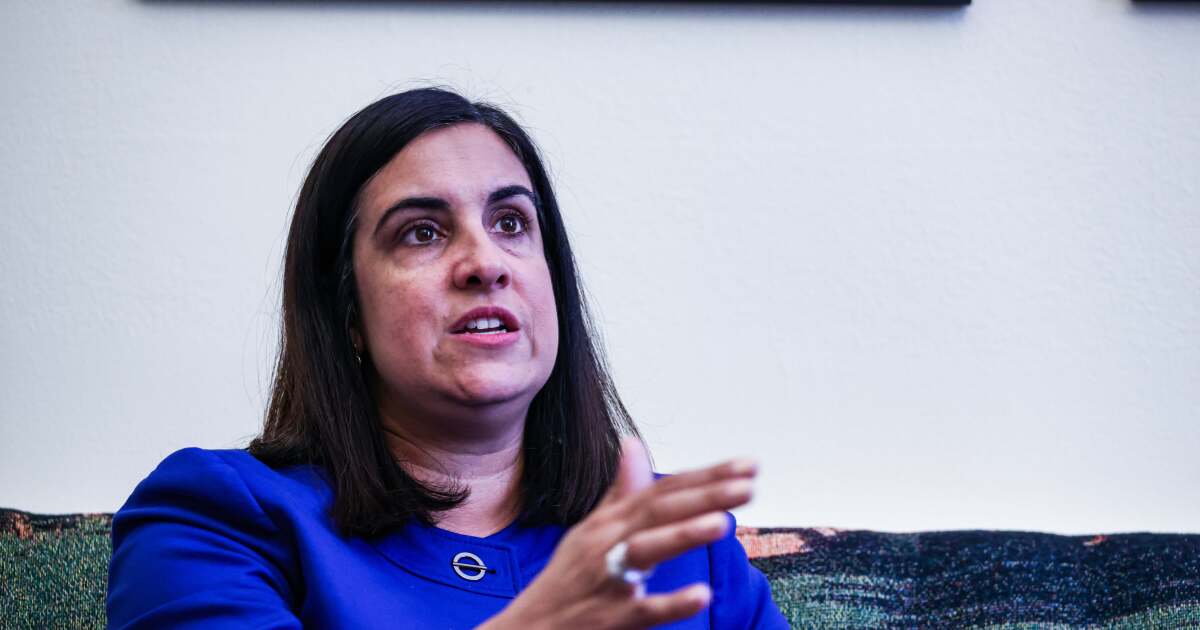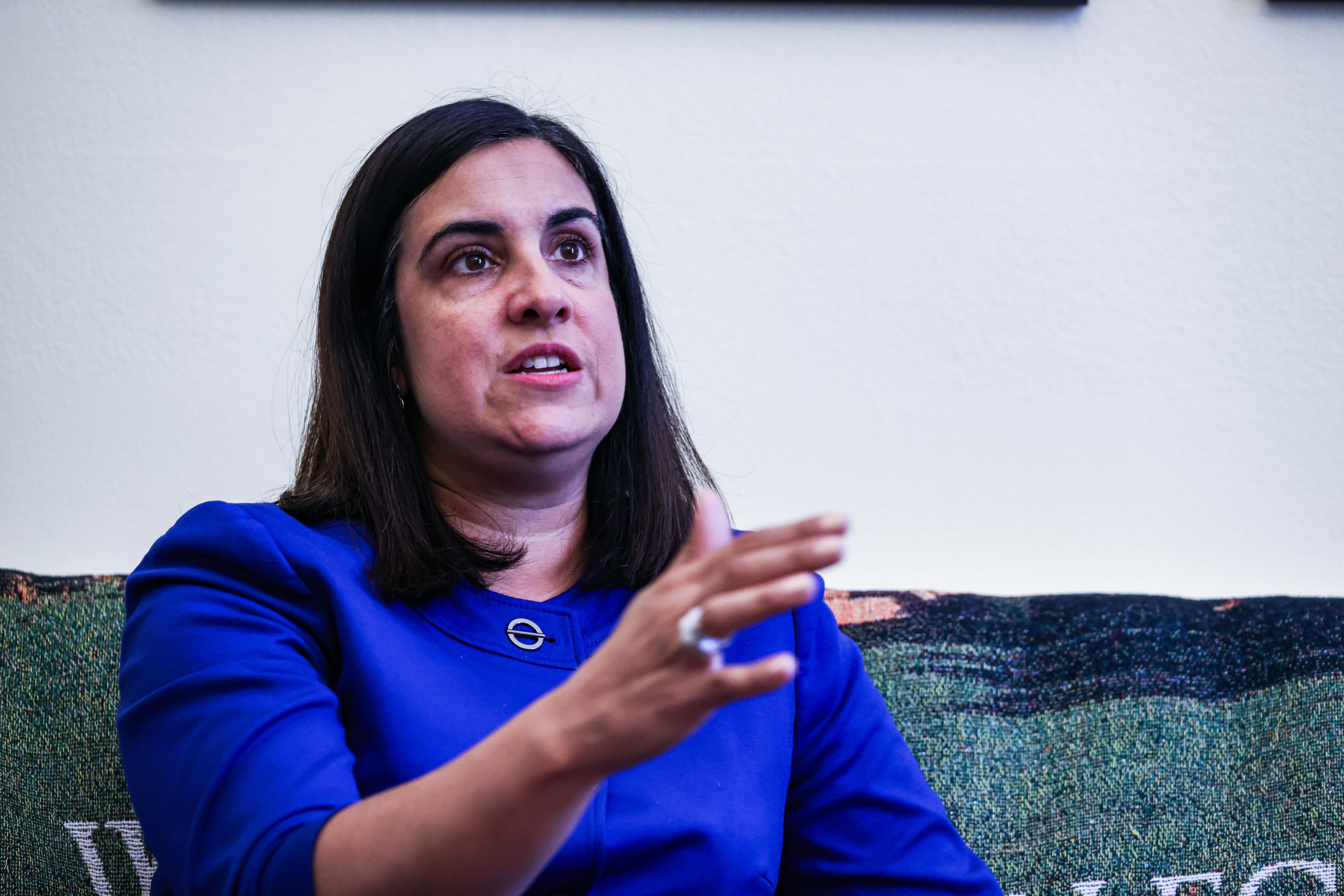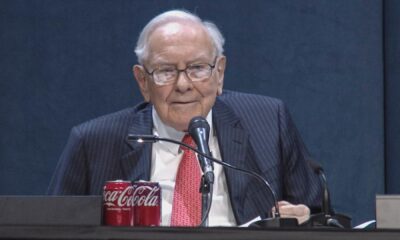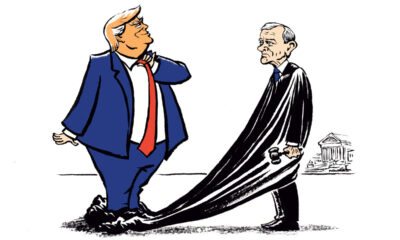Accounting
Tax pros brace for 2026: Trump, TCJA extensions and crypto
Published
4 months agoon

Enjoy complimentary access to top ideas and insights — selected by our editors.
The Internal Revenue Service ended 2024 by debuting regulations on reporting cryptocurrency transactions, amendments for outdated provisions, updates for standard mileage rates and more. And as President-elect Donald Trump gets ready for his second term in office, professionals are looking ahead to what the 2026 tax landscape will look like.
Trump was vocal throughout his campaign about working to extend many of the provisions of his landmark Tax Cuts and Jobs Act of 2017 that are set to expire at the end of this year. Recently, he
Representative Nick LaLota, R-N.Y., said in an interview with Bloomberg that he and a small group of four other representatives are working to push forward a bill to “reasonably adjust” the current $10,000 cap on SALT deductions.
“There are five very salty Republicans — I would expect that somebody in his position would appreciate that dynamic and would want to provide an accommodation to get the bill passed,” he said. “The five of us have the opportunity to effectuate an even more beautiful, big bill.”
Read more:
Most of the current regulations will be in place for the majority of the 2025 tax season, with the steadily gaining pace of regulatory proposals making planning ahead for 2026 one of the key priorities for tax professionals.
Randy Hughes, CEO of Atlanta-based Counting Pennies and co-founder of Seven Figure Profits, said in an interview with Accounting Today that Trump’s return is a likely signal that the current tax landscape would be renewed into next year with some additional provisions.
“The most significant changes include potential new regulations around cryptocurrency transactions, increased IRS scrutiny on high earners and adjustments to clean energy credits,” Hughes said. “Most changes will not be changes to tax law, but the implementation of laws that are already in place … so being familiar with this implementation is important.”
Read more:
Learn more about the IRS’s new rules on crypto reporting, accounting methodology changes and more below.

Yorgos Karahalis/Bloomberg
New rules from IRS on DeFi tax reporting cross the finish line
The IRS released
The new requirements take effect for DeFi companies starting Jan. 1, 2027, after responses gathered in the initial stages of the regulations led the IRS and the Treasury to push back the deadline by two years. Individual cryptocurrency brokers, traders, banks and more are subject to the updated rules as of Jan. 1.
“Although the applicability date proposed by the proposed regulations applied to gross proceeds reporting for sales of digital assets effected on or after Jan. 1, 2025, the Treasury Department and the IRS agree that a delay is warranted for trading frontend service providers treated as brokers (DeFi brokers) under these final regulations,” the regulation states.
Read more:

New crypto rules from IRS will create an information avalanche
Following the Jan.1 effective date of the IRS’s new 1099-DA and finalized regulations for reporting decentralized finance transactions, accountants across the profession worry that many brokers and taxpayers will struggle to quickly adapt to the changes.
“The fact that the IRS is now going to get information about the transactions, and how inaccurate the information will be, is really underappreciated at this point,” James Creech, a director in the tax advocacy and controversy practice of Top 10 Firm Baker Tilly, said in an interview with Accounting Today’s
He further mentioned that the utility of the information gathered through Form 1099-DA reportings will vary in accuracy for the first few years as all eligible parties become familiar with the requirements and standards.
Read more:

Stefani Reynolds/Photographer: Stefani Reynolds/B
IRS expands waiver of eligibility for accounting method changes
The IRS’s newly debuted
Expanded rules include those in Section 5.01(1)(d) and (f) of Rev. Proc. 2015-13 to accounting method changes described in Section 7.01 of Rev. Proc. 2024-23 that are made for any taxable year beginning in 2022, 2023 or 2024.
Read more:

IRS proposal seeks to add tech competency for tax professionals
Last month, the IRS and Treasury Department released
The proposed changes are limited to affect only those who practice before the IRS, and include the following updates, among others:
- Eliminating provisions related to registered tax preparers;
- Classifying the use of certain contingent fee arrangements by practitioners as disreputable conduct;
- Establishing new standards for appraisals and the disqualification of appraisers; and
- Providing rules related to appraisers, including the standards for disqualification.
Read more:

IRS increases standard mileage rate for 2025
The tax service increased its optional standard mileage rate for 2025 by three cents for vehicles driven for business purposes, while other rates remain unchanged since last year.
The rates applicable to cars, vans, pickups or panel trucks, including fully electric and hybrid vehicles, are as follow s:
- 70 cents per mile
driven for business use , up three cents from 2024; - 21 cents per mile driven for medical purposes, the same as in 2024;
- 21 cents per mile driven for moving purposes for qualified active-duty members of the Armed Forces, unchanged from last year; and,
- 14 cents per mile driven in service of charitable organizations, equal to the rate in 2024.
Read more:
You may like
Accounting
AI great at simple tasks but struggles with complexity
Published
16 hours agoon
May 9, 2025
Artificial intelligence has indeed led tech-forward firms (including those in this year’s
On the positive end, firms such as the Texas-based Franklin Alliance reported that adopting AI technology has dramatically increased their capacities as bots take on repetitive manual tasks with an ease and a speed far past more conventional automation setups, allowing accountants to focus more on higher value tasks.
“What’s been most impressive about the AI tools we’ve explored is their ability to dramatically reduce the time spent on repetitive, manual tasks—things like document summarization, data extraction, and even early-stage tax prep. In the right context, these tools create real efficiency gains and allow our team to shift focus to higher-value advisory work,” said Benjamin Holloway, co-founder of Texas-based Franklin Alliance.

madedee – stock.adobe.com
For some, like Illinois-based Mowery & Schoenfeld, these efficiencies have been most impressive on the internal administration side, with AI effectively taking care of the non-accounting work that nonetheless keeps many firms afloat, especially where it concerns meetings.
“Truly most impressive and a huge time savings for us has been AI’s ability to record and summarize Team meetings. Circulating notes and reducing administrative burden on such activities has freed up much capacity, both for our admin side and for partners or management who are not able to be at every meeting,” said Chris Madden, director of information technology.
Others, like top 10 firm Grant Thornton, emphasized AI’s benefits in client-facing activities and noted that it has been especially meaningful in its risk advisory services at least partially due to the firm’s recently-launched CompliAI tool, designed specifically for this area.
“The tool uses generative artificial intelligence and was developed using Microsoft technology, including Microsoft Azure OpenAI Service. CompliAI’s ability to quickly analyze vast datasets and identify potential risks has proven invaluable in combining Grant Thornton’s extensive global controls library with generative AI models and features, including AI analysis, ranking and natural language processing capabilities. As a result, our employees can run control design and assessment tasks in minutes, versus days or weeks. This means clients enjoy faster operational insights, which could amount to a new level of efficiency and a path toward transformative growth,” said Mike Kempke, GT’s chief information officer.
Another positive frequently mentioned, such as by top 25 firm Cherry Bekaert, has been the accessibility and ease of use for many AI solutions even for those without strong technical capacities. Assurance partner Jonathan Kraftchick said this means they did not need to wait long before they began seeing results.
“The most impressive aspect of AI has been its ability to add value with minimal ramp-up time. Many of the tools we’ve implemented have a low barrier to entry, allowing users to start experimenting and seeing results almost immediately. Whether it’s drafting content, conducting accounting research, summarizing meetings, normalizing data, or detecting anomalies, AI has consistently helped accelerate tasks and enable our teams to focus on higher-risk or higher-value areas,” he said.
Several firms, such as California-based Navolio & Tallman, also mentioned improvements to broad strategy and ideation, saying it’s been good for enhancing creativity and accelerating the early stages of their work.
“We’ve still seen value in AI as a jumping off point for ideas and strategy. It’s been helpful for brainstorming, drafting early versions of client communications, and supporting high-level planning conversations,” said IT partner Stephanie Ringrose.
Inconsistencies, inaccuracies, insufficiency, and insecurity
At the same time, firms over and over again said that while the strength of AI comes in handling simple jobs, it often lacks the precision and consistent accuracy needed for higher value accounting work. While it can certainly generate outputs at an industrial scale, trusting that those outputs are correct is another story for firms like Community CPA and Associates.
“AI is incredibly useful for certain types of tasks, such as summarization, data extraction, answering simple questions, drafting communications or documentation, brainstorming ideas, or serving as a sounding board. However, we have observed that most AI tools we’ve tried have difficulty with complex tasks that require lots of context, precision, or domain-specific knowledge. Oftentimes in these cases, AI tools will generate responses that are overly confident or wrong and are missing key information due to not being integrated with other systems or software we have,” said CEO Ying Sa.
Some, like top 25 firm Armanino, noted that these challenges mean that humans need to devote considerable time to ensuring the quality of AI outputs and intervening when the programs go off track.
“The primary disappointment stems from the occasional inaccuracies or biases inherent in AI-generated outputs, commonly referred to as ‘hallucinations,’ necessitating continuous human oversight to ensure reliability. Addressing these inconsistencies remains an ongoing challenge,” said Jim Nagata, senior director of cybersecurity and IT operations.
Top 25 firm Eisner Amper’s chief technology officer Sanjay Desai noted that these issues with accuracy and consistency can be found across AI solutions, though noted that the technology is still quite new and so many things are still in the process of being refined.
“The lows come from the gap between what’s possible and what works reliably in practice. We still need strong guardrails to define valid inputs and outputs, especially in sensitive use cases. Technologies like retrieval augmented generation (RAG) haven’t yet delivered the accuracy or consistency we need when working with proprietary or domain-specific data. Even in mature areas like audio-to-text transcription, we see issues—particularly with accurately identifying speakers in multi-person meetings, which affects the quality of recaps and follow-up actions. In short, while LLMs have come a long way, making them enterprise-ready still requires ongoing human oversight, thoughtful implementation, and continuous refinement,” said Desai.
Another issue reported by several firms was what firms like Navolio & Tallman saw as ongoing security risks from AI solutions that limits their ability to apply the technology to more sensitive use cases.
“The overall attention to security and privacy is still more limited than our industry requires, vendors have not yet aligned their pricing models with the impact their tools make to the business, and vendors still oversell their AI capabilities,” she said.
Top 25 firm Citrin Cooperman also noted–among other things–that the security of these solutions could stand to improve.
“The overall attention to security and privacy is still more limited than our industry requires, vendors have not yet aligned their pricing models with the impact their tools make to the business, and vendors still oversell their AI capabilities,” said chief information officer Kimberly Paul.
Another issue with AI that firms have reported is that solutions today don’t seem to integrate especially well with other programs, which limits the ability of these solutions to work across multiple systems in a single coherent workflow–under such conditions, AI solutions can wind up being siloed from the very areas it is needed the most.
“We believe one of the biggest gaps in current AI solutions is the inability to integrate into other AI solutions to work collectively across one process or workflow. There are many cases where one AI solution is very good at a specific task, while another is very good at another process or task, but the gap is the ability to integrate those solutions together to solve for an entirety of a process or a workflow,” said Brent McDaniel, chief digital officer for top 25 firm Aprio.
There is also the matter of data integration, which is needed for AI systems to gain a more holistic understanding of a firm’s needs. Without such integrations, AI becomes more limited in its ability to develop insights and provide actionable guidance, according to Tom Hasard, IT shareholder for New Jersey-based Wilken Gutenplan.
“We wish AI tools could fully synthesize all of our internal data and unique expertise—beyond the scope of general internet search—and provide detailed, context-specific answers for our team. In the near term, we envision an internal system that taps into our accumulated knowledge to assist staff in resolving complex client problems more quickly. Over time, this capability could be extended to give clients direct, on-demand access to our specialized insights, effectively scaling our expertise and delivering value in a more immediate and personalized way,” he said.
Beyond just data, lack of integration also limits the ability for AI to address complex problems due to lack of cross-disciplinary expertise, according to Kempke from Grant Thornton.
“Current AI solutions lack the deep cross-disciplinary expertise to be able to solve complex issues. AI today is optimized for specific fields and tasks but when it comes to solving problems that span multiple disciplines such as Tax, Legal and Finance, the current solutions are not yet capable of providing meaningful advice and guidance. Grant Thornton is already working with various AI partners on this issue and targets to be a very early adopter of the next iteration of AI that addresses this,” he said.
The AI wishlist
Many firms hoped that the next generation of AI solutions would address these sorts of problems in a way that will allow them to become true assistants capable of taking on complex tasks that require extensive judgment.
“We have found that AI currently lacks in the ability to replicate human creativity and complex decision-making. While AI excels at data analysis and task automation, it struggles with tasks requiring creativity and nuanced judgment. If AI could offer more sophisticated support in areas such as accounting and audit services, its value and impact in our daily lives would be significantly enhanced,” said Jim Meade, CEO of top 50 firm LBMC.
Desai, from Eisner Amper, also pointed out that AI isn’t very good at handling bad data, which is a problem considering that AIs run on data. This means that using AI effectively today still requires a great deal of data processing and sanitation to make information useful. If humans did not need to do so much manual cleanup to get data AI-ready, it would help make the technology even more efficient.
“One of the biggest gaps in AI today is its limited ability to handle bad data. Since data is the foundation of any AI strategy, it’s a challenge that most organizations still face— dealing with messy, inconsistent, or unstructured data. We wish AI could do more to identify, fix, and improve data quality automatically, instead of relying so much on manual cleanup,” said Desai.
Finally, Avani Desai, CEO of top 50 firm Schellman, said that AI needs to not only be safer, it needs to be visibly so, as trust and confidence in the technology is often key to adoption.
“I wish that AI could de-risk itself so that clients would be more open to using it and build client trust. If AI could more clearly demonstrate safety and responsible use, adoption would be much easier. Once people understand it’s here to help—and learn to use it responsibly—the fear will fade,” she said.


Representative Nicole Malliotakis said increasing the state and local tax deduction cap to $30,000 from $10,000 would reduce the tax burden of the vast majority of people in her district, indicating support for a proposal that is dividing Republicans.
“Every member needs to advocate for the particular needs of their district. Tripling the deduction to $30,000 will provide much-needed relief for the middle-class and cover 98% of the families in my district,” Malliotakis, a Republican representing Staten Island, New York and a member of the House tax committee, said in a statement to Bloomberg News on Friday.
Malliotakis’ nod of approval for a $30,000 SALT deduction cap comes as Republicans are fighting among themselves about how high to increase a tax break that has the potential to scuttle President Donald Trump’s entire tax package.
House Speaker Mike Johnson on Thursday said the $30,000 write-off limit is one of several options being discussed. That figure was rejected by several other New York Republicans, including Elise Stefanik, Nick LaLota, Mike Lawler and Andrew Garbarino. California’s Young Kim also rebuffed the idea.
Malliotakis’ district has less expensive property values and lower incomes than some of the other lawmakers pushing for a SALT expansion, making it politically viable for her to accept a lower cap than some of her colleagues.
White House Press Secretary Karoline Leavitt suggested on Friday that Trump would not weigh in on an appropriate level for a SALT cap, leaving it to lawmakers to resolve.
“There’s a lot of disagreement on Capitol Hill right now about the SALT tax proposal, and we will let them work it out,” she told reporters.
House Republicans’ narrow majority means that Johnson needs to win the support of nearly all his members to pass Trump’s tax-and-spending package.
Several of the SALT advocates have said that they are willing to block the bill unless there is a sufficient increase to the deduction. However, most members have not publicly stated how high the deduction must be to win their support.
The debate over SALT has proved to be a particularly thorny fight because it is a political priority for a small but vocal group of Republicans representing swing districts critical to the party maintaining a majority in the 2026 midterm elections.
Expanding the write-off is an expensive proposition, and Republicans have little fiscal wiggle room as they are sparring over ways — including cuts to Medicaid and levy hikes on millionaires — to offset the cost of the tax-cut package.
The House Ways and Means Committee is slated to consider the tax portion of the bill on Tuesday, including SALT changes.
Accounting
GOP eyes endowment tax hike in escalation of Ivy League feud
Published
19 hours agoon
May 9, 2025

House Republicans are considering increasing taxes on university endowments, a significant threat to some of the nation’s wealthiest schools as President Donald Trump seeks to tighten control over American higher education.
The measure is in a draft of the tax package Republicans are weighing, according to people familiar with the matter who spoke on condition of anonymity to share details on the effort. The proposal would create a tiered system of taxation so that wealthy colleges and universities pay more as the size of their endowment grows, the people said.
Republicans are considering boosting the 1.4% endowment tax currently on the books to rates as high as 14% to 21%, a person familiar with the matter said.
The bill is not finalized, however, the people cautioned, and the draft could change as Republicans negotiate its terms, a complex task as the party looks to renew and expand tax breaks and find ways to pay for them with only a narrow House majority.
Targeting university endowments would be a major escalation of Trump’s fight with elite colleges and universities, which has seen the administration demand changes to school policies that reflect his priorities.
The current tax on private-school endowments ensnares many of the richest universities, like Harvard University and Yale University, as well as smaller elite institutions such as Amherst College and Williams College. Some of the wealthiest private colleges in the country boast endowments of at least $500,000 per student.
Harvard, in particular, with a $53.2 billion endowment, has been locked in a high-stakes fight with the Trump administration over its demands for changes at the school. Harvard has sued several U.S. agencies and top officials for freezing billions of dollars in federal funding. Trump has also threatened the school’s tax-exempt status, though experts say revoking that designation would be a lengthy process involving the Internal Revenue Service and the courts.
A new
The poll found that 62% of Americans support maintaining federal research funding, 72% believe “liberals, students and professors can speak freely to at least some extent,” and 84% are concerned at some level about the cost of tuition, an issue Trump has not focused on.
Trump’s 2017 tax package, which Republicans are moving to renew, implemented an endowment levy of 1.4% on net investment income, similar to one that private foundations pay. That levy generated more than $380 million from 56 colleges or universities in 2023 — though it affected just a small fraction of the 1,700 private, nonprofit US schools.
House Budget Committee Chairman Jodey Arrington floated a long list of possible budget cuts in January that included raising $10 billion over 10 years by raising the endowment tax to 14%.
Discussions over the Republican tax package are reaching a critical stage. Trump is meeting Friday with the chair of the House Ways and Means Committee — the chamber’s tax-writing panel, according to people familiar.
Trump and Representative Jason Smith will discuss the draft proposal. The committee is expected to release parts of the bill later this afternoon and the rest of the draft on Sunday night or Monday, the people said.
One of the people familiar cast the effort as a bid by Republicans to ensure that universities spend their endowments on their students and not on other initiatives disfavored by conservatives, such as diversity, equity and inclusion efforts or on challenging the Trump administration’s policies.

Powell may have a hard time avoiding Trump’s ‘Too Late’ label even as Fed chief does the right thing

Foreign tourist boycott begins, as businesses brace for impact

AI great at simple tasks but struggles with complexity

New 2023 K-1 instructions stir the CAMT pot for partnerships and corporations

The Essential Practice of Bank and Credit Card Statement Reconciliation

Are American progressives making themselves sad?
Trending
-

 Finance7 days ago
Finance7 days agoWarren Buffett to ask board to make Greg Abel CEO of Berkshire Hathaway at year-end
-

 Finance1 week ago
Finance1 week agoBerkshire meeting ‘bazaar’ features Buffett Squishmallows, 60th anniversary book and giant claw machine
-

 Personal Finance1 week ago
Personal Finance1 week agoMillions of older workers lost jobs during Covid. Prospects have improved
-

 Economics1 week ago
Economics1 week agoWhy does America have birthright citizenship?
-

 Economics1 week ago
Economics1 week agoHow Donald Trump could rescue John Roberts
-

 Economics1 week ago
Economics1 week agoJobs report Friday to provide important clues on where the economy is heading
-

 Economics1 week ago
Economics1 week agoHow one Ivy League university avoided the president’s wrath
-

 Economics1 week ago
Economics1 week agoJobs report April 2025:
